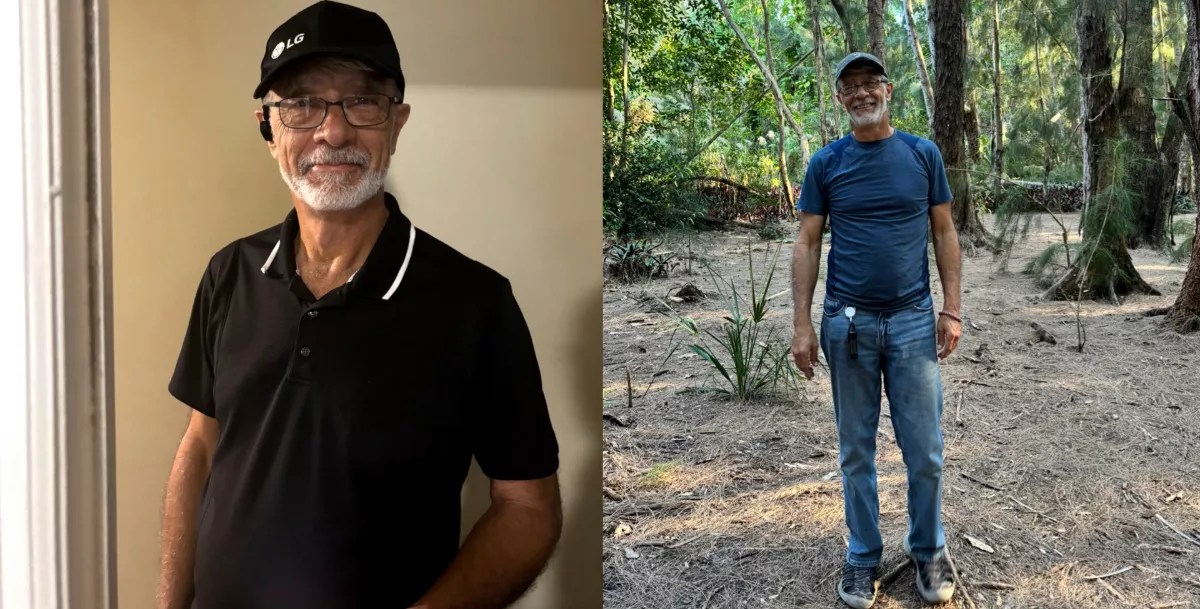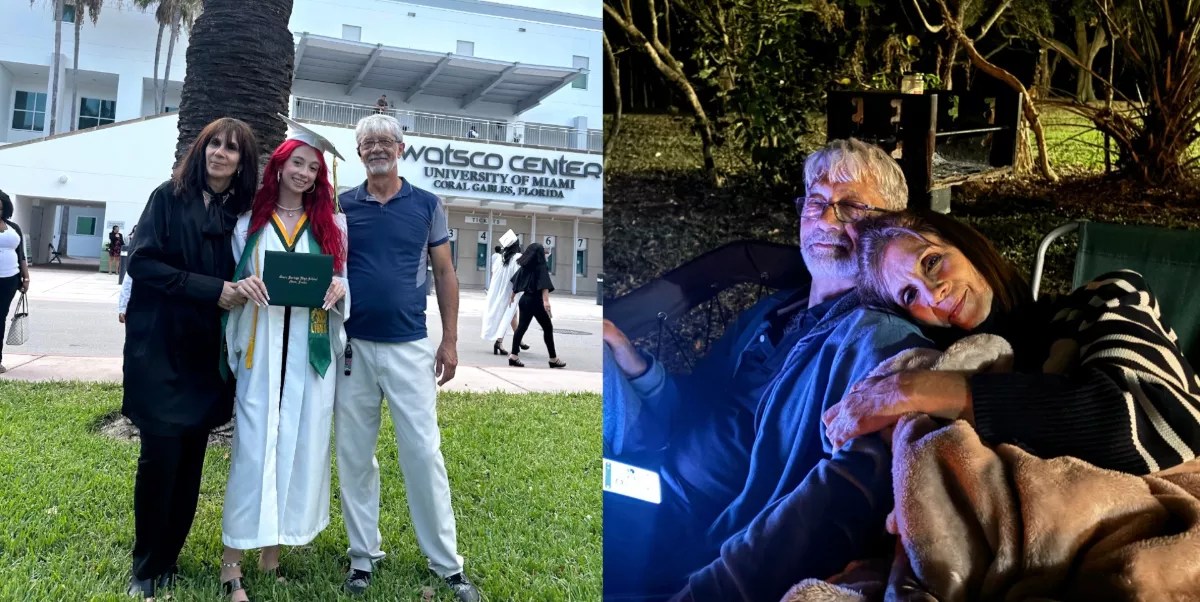
Photo by Carla Artese

Audio By Carbonatix
In late June, after months of saving up for the journey, Carla Artese and her family packed their lives into an RV and left Miami to start a new life abroad.
The plan was to drive cross-country to California, pass through Mexico, visit family in Argentina, and then fly to Madrid, where 19-year-old Carla – born in Spain – would start college and the family would finally settle down. She and her dad, Fernando, planned to create a YouTube channel to document their cross-continental travels. They’d already given it a name, Argentinomades, and designed a logo.
But less than three hours into the road trip, police pulled them over near Jupiter, Florida, and arrested Fernando on a warrant tied to a March charge for driving without a license.
Carla says her 63-year-old father, an undocumented immigrant from Argentina, skipped his traffic court date after hearing that others had been detained by immigration authorities while appearing before a judge.
Police took Fernando to a local jail, where they placed him under an immigration hold. He called his family to tell them he would likely be transferred to Krome Detention Center in Miami.

Left: Carla Artese and her family at her high school graduation. Right: Fernando Artese and his wife, Monica Artese.
Photo by Carla Artese
But after bouncing between facilities for more than a week – during which he spent several days at a U.S. Customs and Border Protection site – Fernando called his family from an unexpected place: the newly built, state-run detention facility deep in the Everglades now known as Alligator Alcatraz.
“Ever since I came [to the United States], I’ve always had the fear of something happening to my dad,” Carla tells New Times. “And I feel like my biggest fear happened, and in the worst situation it could have been.”
Fernando is among several hundred people currently being held at the secretive, remote immigration detention site where detainees say they have limited access to attorneys and are living in inhumane conditions.
New Times spoke with Fernando, his wife, Monica, and their daughter, Carla, about Fernando’s experience at the facility, which officially opened last week at the site of the Dade-Collier Training and Transition Airport, a little-used airstrip in the middle of the swampy Everglades.
The Florida Division of Emergency Management quickly constructed the site, which officials say will detain more than 3,000 people. The Trump administration has touted the facility as a place to hold the “worst of the worst” criminals before removing them from the country.

Fernando Artese and his daughter, Carla Artese, as a child.
Photo by Carla Artese
“Alligator Alcatraz, and other facilities like it, will give us the capability to lock up some of the worst scumbags who entered our country under the previous administration,” U.S. Department of Homeland Security Secretary Kristi Noem said in a June 30 press release.
But if you ask Carla, that narrative doesn’t reflect reality.
“My dad is not a criminal,” she insists.
Since he arrived to the U.S. ten years ago, Carla says, her dad has been a hard-working handyman who, in his downtime, loves spending time in nature, listening to podcasts, and learning about history.
“Nazi Germany persecuted Jews,” Fernando tells New Times. “At this moment, we Latinos are being persecuted.”

Carla and her dad planned to create a vlog to document their cross-continental travels before he was detained.
Logo by Carla Artese
‘Hispanic Concentration Camp’
Fernando tells New Times he’s been at the facility since July 3, when state officials began transferring the first detainees to the hastily-built compound. He was among the earliest to arrive, processed as the 71st detainee.
Since arriving, he says he’s endured chaotic and unsanitary conditions: swarms of colossal mosquitoes, extreme temperature swings from freezing to sweltering, and only three showers total. He’s still wearing the same orange jumpsuit he was given on day one.
At one point, he says the toilets stopped flushing. When staff failed to fix the problem, detainees were forced to remove human waste – by picking it up with their hands and moving it elsewhere themselves – to use the bathroom, all with little to no privacy.
“Nazi Germany persecuted Jews,” Fernando tells New Times. “At this moment, we Latinos are being persecuted.”

Fernando Artese.
Photo by Carla Artese
Fernando describes the site as a “Hispanic concentration camp” full of mostly working-class immigrants.
“We came here for opportunity,” Carla says, “and then we get mistreated.”
Despite the harsh conditions, Fernando says he’s found a sense of community with the other men at the facility, who, like himself, came to the U.S. to work in construction, roofing, or other physically demanding jobs.
“My dad tells me, ‘We’re all like a family in there eating together,'” Carla says. “It’s the Hispanic community.”
While Noem has said the Everglades camp was intended to scare immigrants into self-deporting, Fernando emphasizes that’s exactly what he’s been trying to do.
He says he simply wants to self-deport to Italy, where he holds citizenship.
When New Times reached Fernando by phone on the afternoon of July 10, he said officials at the site had just made an announcement: Anyone who wanted to self-deport should line up. While dozens of detainees quickly formed a queue, he says, the officials then disappeared with no explanation.
It’s unclear whether officials returned later that day.
In the meantime, Carla has created a GoFundMe to raise money for an immigration attorney to help her father. As this reporting, the fundraiser has brought in more than $3,000, gaining traction toward its $8,000 goal.
“This year, we were trying to leave the USA, and ICE got him and sent him to Alligator Alcatraz, where they treat them like criminals and have no rights,” Carla writes in the GoFundMe description. “They haven’t given him any information about his case or any right to an attorney. Not to mention, they haven’t added him to the system yet, so he doesn’t even appear like an inmate anywhere.”
She’s holding out hope that officials will let her dad self-deport to Europe, and that they’ll be together again soon. While she doesn’t know the next time she’ll see him, she says she still plans to bring his dream of the Argentinomades vlogs to life.
“I know he’s still going to want to make that project,” she says, “so I would love to make it and have people follow it so when he gets out, he can see that.”
In response to a request for comment regarding the allegations of conditions at Alligator Alcatraz, Stephanie Hartman, a spokesperson for the Florida Department of Emergency Management, sent the following statement via email:
“Those allegations are completely false. The facility meets all required standards and is in good working order.
Detainees have access to potable water from on-site tanks refilled by 6,000-gallon trucks. Each individual is issued a personal cup they can refill at any time, and bottled water is provided at meals. Tanks are regularly sanitized, flushed, and tested to ensure water quality. Full-size showers are available daily with no restriction on bathing water.
All wastewater is hard-pumped into 22,000-gallon frac tanks, maintained below 50% capacity and pumped daily to minimize transfers. Tanks, hoses, and connections are fully contained to prevent spills and are regularly inspected to ensure zero environmental impact.”